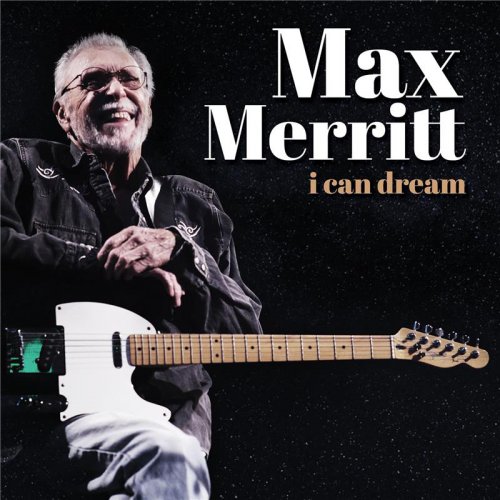Max Merritt & The Meteors - Album Review: i can dream
 There is no doubt that Max Merritt is a Kiwi icon, seen as one of the region’s most important musicians to come out of the Fifties, with his impact on soul, rock and R'n'B meaning he was inducted into both the ARIA Hall of Fame and the New Zealand Music Hall of Fame. Sadly, he was diagnosed with a rare auto immune disease in 2007, and died in Los Angeles, California, on 24th September 2020, at the age of 79. Prior to his death he had been working on his first new album for some forty years, i can dream (all in lower case),
There is no doubt that Max Merritt is a Kiwi icon, seen as one of the region’s most important musicians to come out of the Fifties, with his impact on soul, rock and R'n'B meaning he was inducted into both the ARIA Hall of Fame and the New Zealand Music Hall of Fame. Sadly, he was diagnosed with a rare auto immune disease in 2007, and died in Los Angeles, California, on 24th September 2020, at the age of 79. Prior to his death he had been working on his first new album for some forty years, i can dream (all in lower case),
The album comprises three different recording periods, with five songs recorded in Los Angeles between 2011 and 2020, another two recorded in 2018 at a different studio, plus ten songs recorded in Melbourne in 2002 for what was being described back then as being a new album. The result is something which actually sounds as if it was recorded at one period in time as opposed to being spread out, with the only real differentiation being the production. Overall, the production is very good, but there are also times when it really grates as auto tune has been used in certain places. This is one of my pet hates in the modern music scene, even more than my loathing of drum machines before they became decent, and in many ways, this has done a disservice to the end result, which is a really enjoyable album indeed, and I would much rather this had been left far rawer.
Max will probably always be best remembered for Slipping Away, a major hit in both Australia and New Zealand in 1975, and with this album we are definitely taken back to the Seventies. He has a wonderful voice, mellow and gentle and in many ways reminiscent of a more soulful Bob Seger from that period. Add in some wonderful songs, with great lyrics and hooks, lush backing vocals, and one can see the flares and platforms. There are times when he brings in a much stronger blues influence, and mixes up the accompaniment, including an accordion, slide guitar or brass, all of which makes this feel far more earthy and real. Sunbury is a real delight, a song out of time, as he sings about the 1972 Sunbury Festival where Max Merritt & the Meteors was one of the acts (they also played in 1973), and sings the line “if you remember Sunbury, you weren’t there!”
It is mellow, easy listening, yet also with an edge and one can certainly hear why he was such a major draw, as he just sounds totally relaxed and fully in control at all times. It is the type of album that can be played and enjoyed on first hearing yet the most it is played the more it becomes like a comfortable leather armchair, with the listener relaxing right in. The horns and piano on I Don’t Wanna Lose You are sublime, just right, with Max’s vocals right to the fore, bass and drums keeping it basic and Hammond providing some wonderfully dated chords. He can rock as well, with closer Candy Row having some real bite, with the brass over the top, and the hooks and edge right there. Max may no longer be with us, but hopefully this album will remind people of his legacy.
About Max Merritt & The Meteors

Max left school in 1956 to serve an apprenticeship under his brick-laying father. Buying himself an electric guitar, he formed his first group, the Meteors, in 1956. The group was made up of friends Ross Clancy on saxophone, Ian Glass on bass, Peter Patene on piano and Pete Sowden on drums.
His mother Ilene became concerned seeing young people sitting around Cathedral Square on winter Sunday afternoons with nothing to do, so with the help of her family decided to hold Sunday dances. Also with the help of Kerridge-Odeon theatre manager Trevor King, a venue was set up. The Christchurch Teenagers Club held in the Railway Hall in Sydenham, became so popular that up to 900 youngsters attended the dances held between 1pm and 6pm. For a charge of two shillings and sixpence, dance-goers were treated to music provided by a teenage Max Merritt and the Meteors, while a buffet tea of scones, sandwiches and hot saveloys was served by Mrs Merritt and her daughter Pam.
Visit the muzic.net.nz Profile for Max Merritt & The Meteors
Releases
Other Reviews By Kev Rowland
07 Jul 2023 // by Kev Rowland
So it was down to Tuning Fork for the first night of the second Crushfest festival. Tonight was going to be Wellington and Auckland bands, and then some of the same will be playing at the second night in Wellington next month.
Read More...
 Rain - Single Review: Love and War
Rain - Single Review: Love and War
15 Jun 2023 // by Kev Rowland
It has been quite a while since I last heard from Wellington-based singer songwriter Cathy Elizabeth, and back then Rain was seen solely as a studio project with Cathy being accompanied by Thomas Te Taite, who provided all the instrumentation including digital drums. Now they are a full band who have been performing live, and it is the first time they have recorded as such, with Thomas now, just providing acoustic guitar (plus engineering and producing etc.
Read More...
 Lost Vessels - Single Review: All This Time
Lost Vessels - Single Review: All This Time
01 Jun 2023 // by Kev Rowland
I must admit I was not that impressed when I first saw Lost Vessels play at Crushfest, something they later admitted to me was the worst gig of their career, but since then they have improved in leaps and bounds. This has been noticed by others on the Auckland circuit as they are getting more opportunities with better support slots, and I was not at all surprised when they won the Ding Dong Lounge Battle Of The Bands in November last year.
Read More...
 Unwanted Subject - Single Review: Sons of Savages
Unwanted Subject - Single Review: Sons of Savages
28 May 2023 // by Kev Rowland
I have caught Unwanted Subject in concert a few times over the last couple of years, and while they have been getting better each time I have seen them, I must admit that nothing prepared me for this, which right from the off is a monster. I have never heard them quite this is aggressive, nor as polished, and this multi-sectioned single sounds almost like a different band as they have pushed their metal roots to the max in this metalcore beast which sees them mixing and blending different genres to create something quite special.
Read More...
 Gig Review: Stray Dogs @ AUX, Auckland - 26/05/2023
Gig Review: Stray Dogs @ AUX, Auckland - 26/05/2023
28 May 2023 // by Kev Rowland
So it was back to Ding Dong Lounge on a Friday night for one of their infamous Emo nights, which tonight was a three-band bill with Stray Dogs having an extended set, supported by Altaea and then up first we had Blindr, a band new to me. Blindr are a quartet featuring Bill Caldwell (vocals, guitar), Blake Woodfield (lead guitar), Jack Power (bass), and Charlie McCracken (drums).
Read More...
 Gig Review: Turkey The Bird @ The Ministry of Folk, Auckland - 27/05/2023
Gig Review: Turkey The Bird @ The Ministry of Folk, Auckland - 27/05/2023
27 May 2023 // by Kev Rowland
Back up to Auckland Guide Centre in Mount Eden tonight for my second consecutive gig (Sol suggested it was a turkey sandwich as I am at Vader tomorrow) to see Taranaki’s finest, Turkey The Bird at The Ministry of Folk. Before that we of course had Hoop, who are Al Baxter (vocals, guitar, harmonica, banjo, mandolin), Nick Edgar (vocals, guitar, ukulele, flute, harmonica), Emily Allen (violin, viola), Glenn Coldham (bass) while tonight Gary Hunt was filling in for drummer Rusty Knox.
Read More...
 This Silent Divide - Single Review: Beautiful Creature
This Silent Divide - Single Review: Beautiful Creature
25 May 2023 // by Kev Rowland
Here we have the latest single from Wellington-based melodic hard rock quartet This Silent Divide, entitled Beautiful Creature. I really enjoyed their Tall Stories EP, and they played a great gig at Dead Witch towards the end of last year, and this would have been recorded at about the same time.
Read More...
 Gig Review: Emily Rice @ Your Local Coffee Roasters, Pukekohe - 24/05/2023
Gig Review: Emily Rice @ Your Local Coffee Roasters, Pukekohe - 24/05/2023
24 May 2023 // by Kev Rowland
Earlier this week I had a message from Emily Rice asking me if I lived in South Auckland. When I responded I did, she asked if I would be interested in coming along to an event she was putting on in a coffee shop in Pukekohe to celebrate the release of her new single, Warenoa.
Read More...
Most Viewed Artists
Latest Galleries
NZ Top 10 Singles
- APT.
ROSÉ And Bruno Mars - DIE WITH A SMILE
Lady Gaga And Bruno Mars - BIRDS OF A FEATHER
Billie Eilish - TASTE
Sabrina Carpenter - I LOVE YOU, I'M SORRY
Gracie Abrams - ESPRESSO
Sabrina Carpenter - SAILOR SONG
Gigi Perez - LOSE CONTROL
Teddy Swims - A BAR SONG (TIPSY)
Shaboozey - GOOD LUCK, BABE!
Chappell Roan






















 Report A Problem
Report A Problem

